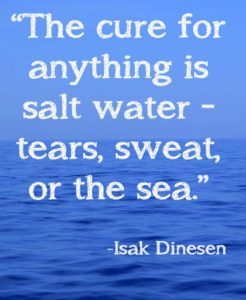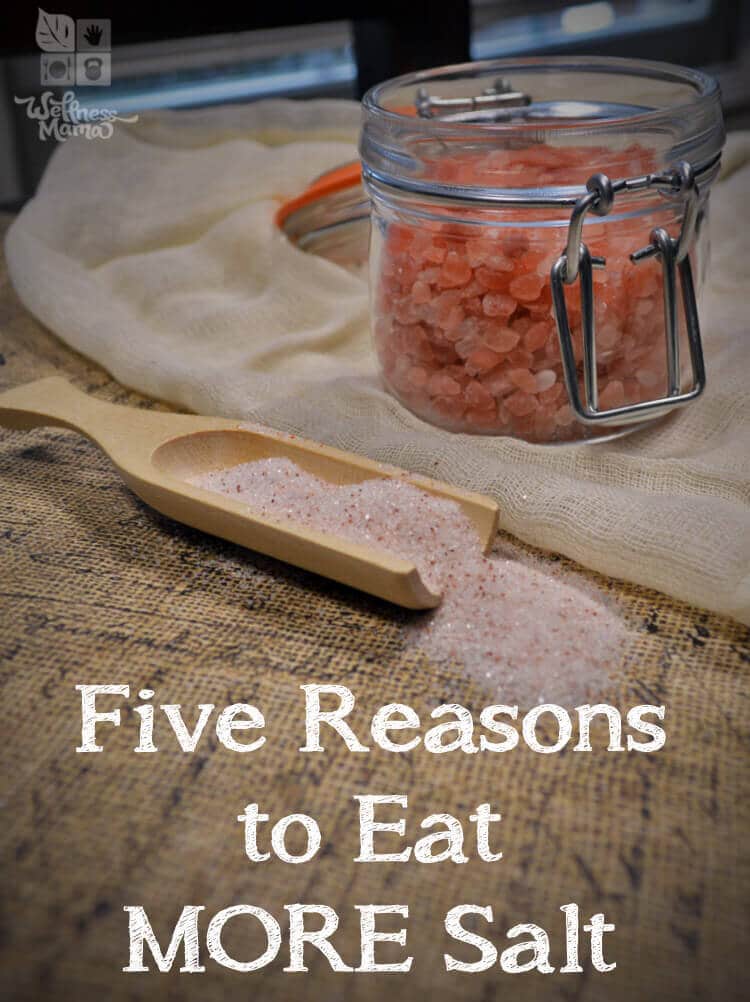Salt has gotten a really bad reputation in the past, and now there seems to be a lot of confusion about if salt is healthy or not.
It is important to note that the type of salt makes a big difference in whether it is healthy or not. Many of the studies about sodium intake were done with incomplete salts.
Just as…
- Feed lot grain-fed beef is not the same as completely grass fed beef, and
- Conventional produce is not the same as organic produce, and
- Farm raised fish is not the same as wild caught fish, and
- Hydrogenated trans fat is not the same as medium chain fatty acids found in coconut oil
Man-made table salt is not the same as mineral-rich natural salt. Real salt has many important roles in the body and avoiding it can be problematic. As I said before:
Table Salt = BAD!
Table salt, which is 97% Sodium Chloride (NaCl) is chemically produced, bleached and devoid of most other nutrients. It also contains Aluminum in many cases, which has been linked to Alzheimers disease and other problems in the body. Plus, it’s devoid of many trace minerals that the body needs.
This type of salt is not naturally occurring and in fact, when salt-water fish are placed in salt water made with table salt… they die.
However, table salt is often iodized. Before you toss your table salt, be sure to start eating more foods with naturally occurring iodine, like seaweed.
If you have any of this type of table salt around your house, I’d recommend that you stop using it immediately. Don’t throw it out though… you can use it in natural cleaning and stain treatment. (Just don’t eat it!)
Real Salt = Good!
 To the degree that table salt is bad, real salt is healthy, necessary and good.
To the degree that table salt is bad, real salt is healthy, necessary and good.
While the research linking regular table salt to disease and health disorders is correct, we’ve thrown out the baby with the (salt) water.
Consider this: the body contains high concentrations of many minerals and nutrients, and while it needs water, it also must have the proper concentration of these nutrients in bones, blood and organs to function properly.
A person can’t be given an IV of plain water- it must contain a careful balance of minerals, including salt!”
Why Should You Eat More Salt?
Here are five reasons I personally make sure I consume enough healthy salt each day:
- For Insulin Sensitivity: The “link” between salt intake and cardiovascular problems is getting a lot of scrutiny lately. At the same time, research is showing a link between low salt consumption and insulin resistance (and moderate/high salt intake and insulin sensitivity). With the rising rates of blood sugar related problems, this is an important factor to consider. (source, source)
- Hydration: I drink Sole (a specially hydrated salt water) every morning for the energy boost, reduction in allergy symptoms and the hydration. Salt (and the other trace minerals present in natural salts) are essential for proper hydration.
- For Longevity: Low salt intake is actually linked to shorter life expectancy. Chris Kresser explains: “The average American consumes about 3700 milligrams of sodium a day. This value has remained constant for the last fifty years, despite the rise in rates of high blood pressure and heart disease. (2) As a comparison, the Japanese, with one of the highest life expectancies in the world, consume an average of 4650 milligrams of sodium per day, and have a lower risk of cardiovascular disease than most other developed countries. (3, 4)”
- For Hormones: From Mark’s Daily Apple: “First, salt has been shown to speed up cortisol clearance from the blood. The faster you clear cortisol, the quicker you recover from a stressor. If cortisol lingers, you “stay stressed.”Second, there’s evidence that stress increases salt appetite. In lab mice, activation of the sympathetic nervous system by a stressor causes them to prefer salt water to plain water. Similar findings have been observed in rats subjected to stress. In humans, acute bouts of stress don’t seem to increase salt appetite, but chronic stress does increase intake of salty, processed junk food.” (source)
- Digestion: On a personal note, I’ve noticed a big improvement in my own digestion since adding Sole (hydrated salt water) each morning, and recent news is supporting this idea. From this article: “Salt plays a primary role in the processes of digestion and absorption. Salt activates an enzyme in the mouth called salivary amylase. At this point, the salt allows your taste buds to taste the food. Salt also plays a role in digestion by helping to break down food. Salt also creates hydrochloric acid. Hydrochloric acid is a very important digestive secretion, which lines the stomach walls.”
Keep in mind that not everyone should increase their salt intake. Those with Menier’s disease, congestive heart disease, hypertension and kidney disease especially should check with their doctor before changing their salt intake, as increased salt can really make them ill.
What Type of Salt?
The type of salt consumed is really important when talking about the health benefits. There is a tremendous difference between Himalayan salt which contains 93 additional trace minerals and regular table salt which is created in a lab and contains two.
I have a variety of healthy salts at our house and I use them in cooking, skin care and to make Sole. We use:
- Himalayan Pink Salt– I use this to make Sole (here’s how to make it) and in cooking. It has a much milder flavor than conventional salt and after using this for a few months, conventional table salt has a bitter taste to me. It comes from ancient salt stores in the Himalayan mountains and we even have lamps made out of this type of salt in our house.
- Redmond Real Salt– Also from ancient salt beds. Redmond salt has the mildest flavor of all the salt’s I’ve tried and I often use it in cooking dishes where I only want to lightly enhance the flavor but don’t really want the salt taste to come through.
More Reading
New Study Finds No Connection Between Salt and Heart Disease
CNN- Low Salt Diet Ups the Risk of Heart Attack?
Scientific American – It’s Time To End the War on Salt
Shaking Up the Salt Myths – Chris Kresser
Salt: What Is It Good For? – Mark Sisson
Salt, We Misjudged You – NY Times
Healthy Benefits of Salt Baths
This article was medically reviewed by Dr. Ann Shippy, who is Board Certified in Internal Medicine and a certified Functional Medicine physician with a thriving practice in Austin, Texas. As always, this is not personal medical advice and we recommend that you talk with your doctor.
Are you a salt eater? What kind of salt do you use? Share below!


Leave a Reply